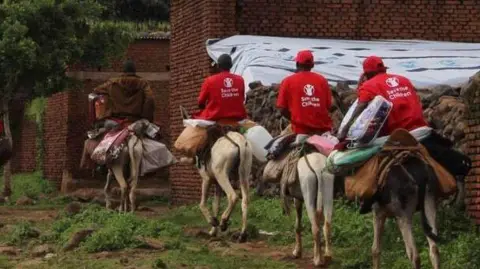Aid workers on donkeys have delivered the first humanitarian supplies to survivors of a landslide that reportedly killed hundreds of people in a remote mountain village in Sudan's western Darfur region.
Heavy rains and flash floods that hit Tarasin village triggering the disaster on Sunday have continued, meaning donkeys are the only way to reach the affected families.
Families in Tarsin have lost everything. It took our team more than a full day on a rocky, muddy, and hilly route to reach this devastated community, said Francesco Lanino, from aid agency Save the Children.
It remains unclear how many people died. The armed group in charge of the area put the number at 1,000, however, the health ministry says only two bodies have been recovered.
On Thursday, local civilian leaders said they had recovered and buried the bodies of hundreds of people.
We recovered 370 bodies and buried them. Others are still trapped under the rocks and some were carried away by floodwaters, said Ibrahim Suleiman, one of the local leaders in Daramo locality.
The SLM/A has remained neutral in the civil war which has been ravaging Sudan for more than two years, leading many to seek refuge in the Marra Mountains area where the landslide occurred.
Antoine Gérard, the UN's deputy humanitarian co-ordinator for Sudan, earlier gave the figure of 370 deaths, noting the difficulty in assessing the scale of the disaster due to access challenges.
On Thursday, an emergency team of 11 staff riding donkeys delivered medical supplies, food, water, and tarpaulins to the affected communities in a journey that took over six hours.
The situation highlights a deepening humanitarian crisis in Sudan, with the ongoing conflict further complicating rescue efforts.
About 150 people have been displaced from Tarsin and neighbouring villages, with families now sheltering in nearby communities, according to the International Organization for Migration (IOM).
Heavy rains and floods have affected at least 21 areas across Sudan in recent weeks, raising fears of disease outbreaks.




















